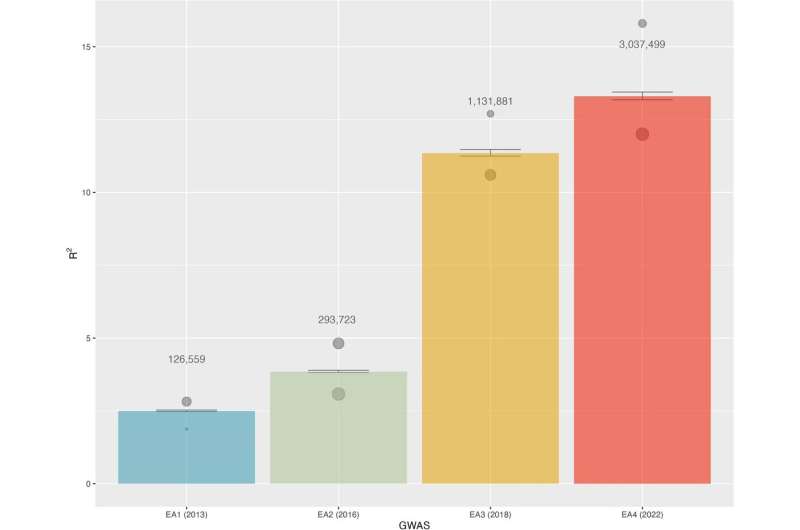This article has been reviewed according to Science X's editorial process and policies. Editors have highlighted the following attributes while ensuring the content's credibility:
fact-checked
trusted source
proofread
DNA may be a powerful predictor of educational success, new research suggests

Researchers at the University of York are calling for further exploration of the role DNA could play in predicting educational outcomes. The work is published in the journal Educational Psychology Review.
The researchers point to the findings of their new study, which reveal that recent advances in DNA analysis mean we now know genetics are one of the strongest predictors of how far an individual will go in education and the grades they will achieve.
By pooling data from multiple studies looking at the links between genes and education, the researchers gained an overview of how good genetic testing has become at predicting educational outcomes.
Genetic differences
They found that up to 25% of differences in school grades between individuals can be attributed to genetic differences. This is a greater effect than a person's family socioeconomic background (10%) and the Ofsted rating of the school a child attends, which only accounts for 4% of an individual's educational success.
The study found that even small differences in a person's genetic propensity for education make them more likely to spend an extra year in education, which in the UK could mean earning a master's degree.
The findings raise questions about whether genetic testing could one day be used to identify and support children who are likely to struggle at school, the researchers say.
Ethical and social values
"While much more work is needed before we could predict how well individual children are likely to do, we hope our research will spark discussion about the potential to predict children's risk of poor academic outcomes," lead author of the study, Kirsty Wilding from the Department of Education at the University of York says.
"These discussions must consider not only scientific criteria but also ethical and social values," Professor Sophie von Stumm, the study's senior author adds. "It is understandable that many people fear genetic testing could result in discrimination. That's why we need to make sure that we safeguard how research in this area is conducted and communicated.
"Knowing how genetics affect education could help us in the future to step in and give children personalized extra support before any learning difficulties develop."
The researchers say that advances in methods mean careful consideration should be given to the safeguarding measures that should be put in place to ensure genetic testing would be used to reduce achievement gaps while avoiding risks.
Not set in stone
"A child's genetic propensity for education does not mean their traits or abilities are set in stone, they simply indicate a genetic tendency or likelihood to think, feel, and act in certain ways," Wilding says. "Positive home and school environments significantly affect children's long term outcomes and a person's genetic makeup could never justifiably be used to write them off as someone unlikely to succeed in education."
The researchers also emphasize that genetic influences are impacted by "gene-environment correlations."
"Individuals select, adapt to, and shape their environments to correspond with their genotype," Wilding adds. "For example, individuals with a genetic tendency for reading might spend their free time at the library, which in turn improves their reading skills. So genetic and environmental influences exist in balance with each other, and certain environments are needed to allow genetic tendencies to be expressed."
Polygenic scoring
The relationship between genetics and educational outcomes is tested through polygenic scoring, a statistical technique which adds up the effect of DNA variants.
Polygenic scores are created from large studies that examine the DNA of millions of people. These studies look for specific DNA variants, called Single Nucleotide Polymorphisms (SNPs), that people with a shared trait have in common.
To identify variants associated with education levels, researchers compare the DNA of people with a range of educational qualifications, from those who didn't finish compulsory education to those who have a Ph.D. They identify which DNA variants are common at both ends of the education spectrum. Some SNPs might increase the likelihood of higher educational attainment, while others might decrease it. By counting how many of these specific DNA changes a person has, researchers can give them a "score" which predicts their educational success.
Limitations
The researchers highlight the limitations with this technique, which includes the fact that 80% of the data polygenic scores are currently based on is from people of European ancestry.
"There is a need to significantly boost the diversity of participants in genetic studies," Professor von Stumm says. "Genetic markers vary among different ethnic groups, and the same polygenic scores aren't universally effective due to unique DNA variants in each group.
"To make polygenic scores equally predictive for everyone, we need to address this Eurocentric bias."
More information: Kirsty Wilding et al, Using DNA to Predict Education: a Meta-analytic Review, Educational Psychology Review (2024). DOI: 10.1007/s10648-024-09928-4
Provided by University of York





















